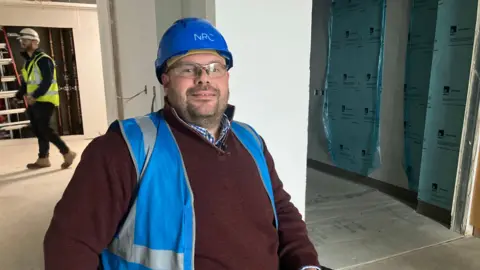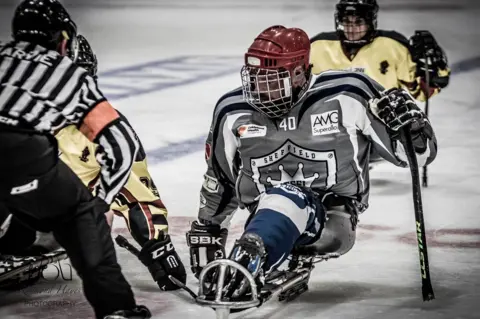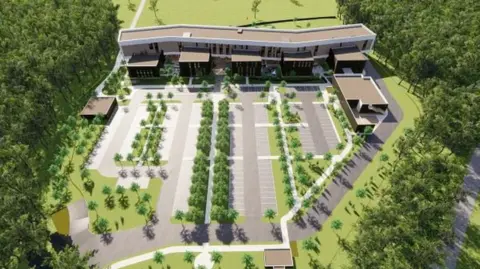Former Paralympian 'bowled over' by rehab centre
 BBC
BBCA former Paralympic ice hockey player says he has been "bowled over" by the development of a new £105m NHS rehabilitation facility, which is set to open for people overcoming serious injury next year.
Mark Briggs, from Ollerton in Nottinghamshire, visited the 70-bed National Rehabilitation Centre (NRC) before it opens its doors in the summer.
The site, which is being built at Stanford Hall near Loughborough, will "transform" patients' recovery, according to the NHS.
The 47-year-old, who was named ambassador of the facility in August, said it was "amazing" seeing the project progress.
Mr Briggs was five years old when he was kicked in the shin at school, triggering a rare genetic condition that resulted in his leg being amputated at 15.
 Peter Best
Peter Best"I'm bowled over by the project," he said. "The last time I was here, it was a steel frame, now I can actually see rooms being kitted out.
"I get the feel that the environment is going to be much different to what you would experience in a traditional hospital.
"It's just amazing to see the rehabilitation site come to life. To be able to go through real meaningful rehab in a great environment with great staff. I think this is nationally inspiring."
Mr Briggs, who was selected for the Team GB ice hockey team and competed in the 2006 Paralympic Winter Games in Turin, Italy, has advocated for disability access since he retired in 2018.
The centre, which will neighbour the Defence Medical Rehabilitation Centre for armed forces personnel, will be run by the Nottingham University Hospitals NHS Trust.
 National Rehabilitation Centre
National Rehabilitation CentreThe NRC said it would focus on immediate acute rehabilitation, chronic and long-term rehabilitation and preventative pre-rehabilitation, using state-of-the-art medical technology.
Mr Briggs added: "Having had my own experiences of a lack of rehabilitation, and having seen what the Defence Medical Rehabilitation Centre near Loughborough is achieving, we are missing a trick when it comes to post-medical rehab.
"The medical system works wonders, but the mechanisms for post-medical healing in the following weeks, months and years are crucial too, and in many cases aren't there at the moment."
The centre will use and develop new technologies in partnership with the University of Nottingham and Loughborough University.
Follow BBC Nottingham on Facebook, on X, or on Instagram. Send your story ideas to [email protected] or via WhatsApp on 0808 100 2210.
